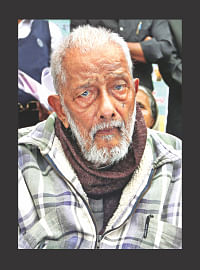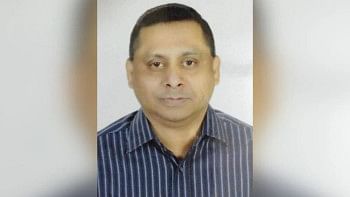Language movement hero Matin no more

His courage inspired others to stage an instant protest before the all-powerful politician of Pakistan. On March 24, 1948, Abdul Matin along with other students was present at the special convocation at Dhaka University to receive his degree. Mohammad Ali Jinnah, the governor general of Pakistan, was the convocation speaker.
Jinnah in his speech announced that “Urdu and only Urdu shall be the state language of Pakistan”. This infuriated Matin. He was among those who stood up to protest in one voice: "No. No.”
It was this protest that created the momentum for the Language Movement in the subsequent years. It also played a significant role in shaping up the then national politics which contributed largely to the overwhelming victory of the United Front in the 1954 election.
Then Bangla was recognised as one of the state languages of Pakistan at a session of the National Assembly on May 9, 1954, six years after the Pakistan Legislative Assembly rejected a proposal in this regard.
Aged 88, the language movement hero died yesterday morning, bringing an end to an illustrious political career that inspired hundreds of thousands in building a right-based society.
Matin's battle was also one against the bourgeois society to establish people's rights. And yet that never seemed enough to him. He donated his body and his eyes through a will in 2006 for the cause of humanity, the core interest and the driving force of his life.
In recognition of his numerous contributions, Matin was honoured with many awards, including Ekushey Padak in 2001. Dhaka University in 2008 conferred honorary doctor of law degree on him for his contribution to the Language Movement.
The authorities of Bangabandhu Sheikh Mujib Medical University, where he had been undergoing treatment since August 19, declared him dead at 9:00am.
Body of Matin, popularly known as “Bhasha” (language) Matin for his pivotal role in the Language Movement of 1952, will be taken at the Central Shaheed Minar at 12:00noon today for people to pay tribute.
He suffered a stroke on August 18 and was treated at a city hospital before being shifted to BSMMU the following day. He was unconscious since.
He underwent a surgery on August 20 and was put on life support on October 3, BSMMU Director (Hospital) Brig Gen (retd) Abdul Majid Bhuiyan told The Daily Star.
After his death, a team of Sandhani, a voluntary organisation, collected his corneas as per the last wish of the leftist leader. Later, his body was kept at the hospital mortuary.
Today, after the Shaheed Minar programme, his body will be handed over to Dhaka Medical College Hospital for medical research, his wife Gulbadan Nesa Monika said.
President Abdul Hamid, Prime Minister Sheikh Hasina, opposition leader in parliament Raushan Ershad and BNP Chairperson Khaleda Zia, among others, expressed their deep shocks at his demise.
As the news spread, his political colleagues, relatives and well-wishers thronged the BSMMU. Among them were eminent jurist M Amir-ul Islam, Communist Party President Mojahidul Islam Selim and former DU vice-chancellor Prof Emazuddin Ahmed.
Matin was born to Abdul Jalil and Amena Khatun at Dublia village under Chouhali Upazila of Sirajganj on December 3, 1926. His family later moved to Darjeeling of West Bengal in India.
He started his education there, but returned to Bangladesh a few years later.
In 1943, he passed entrance examination (equivalent to SSC) and higher secondary from Rajshahi Government College in 1945 before his admission in BA at Dhaka University. He took admission for his MA at DU in 1947.
Matin was arrested in 1949 for leading a procession of DU's class four employees. On his release after serving two months in jail, the DU authorities cancelled his studentship for three years.
In 1950, he was elected convener of DU All-party State Language Movement Committee and he led the students to defy section 144 in Dhaka as part of the movement to establish Bangla as a state language, according to Matin's memoirs “Jebon Pather Bankey Bankey”.
He was arrested again on March 7, 1952.
He played an active role to form Chhatra Union in April 1952 and became the second president of its East Pakistan unit. Matin was appointed secretary of Communist Party's Pabna district unit in 1954. Three years later, he joined Maulana Bhasani's NAP.
He formed East Pakistan Communist Party (ML) in 1958 and followed the ideology of Charu Majumdar, a communist revolutionary of India.
After liberation, he fought against Jatiya Rakkhi Bahini and was arrested in 1972.
After his release in 1977, he forsook Charu Majumdar's ideology and joined farmers' movement. He also played an active role in forming Bangladesh Workers Party in 1992.
In 2006, he declined to accept the post of a central leader of the party but he never left the party, according to a party leader.
He has authored several books, including “Bangalee Jatir Utsya Sandhan and Bhasha Andolan,” “Bhasha Andolan Ki Ebong Keno” and “Bhasha Andolaner Itihash,” reports BSS.
In his birthplace Chouhali, villagers spoke of their shocks but also of their pride for what one of their sons has become for the nation.
“The people of Chouhali as well as Sirajganj have lost a great son of the soil but he will live on in the hearts of the people of Chouhali,” said Abdullah Al Mamun, chairman of the upazila.
Matin left behind his wife, two daughters -- Matia Banu Suku, a popular playwright and director, and Maliha Suvon, an English medium school teacher -- and a host of relatives and well-wishers to mourn his death.
But what else, if not his ideology and his hope for a society free of inequality and discrimination?
As the language hero's widow Gulbadan puts it: “He always said, 'We have to work for the betterment of the country. We have to protect the people'. He always dreamt of a country truly meant for the people. It was his last wish.”

 For all latest news, follow The Daily Star's Google News channel.
For all latest news, follow The Daily Star's Google News channel. 



Comments